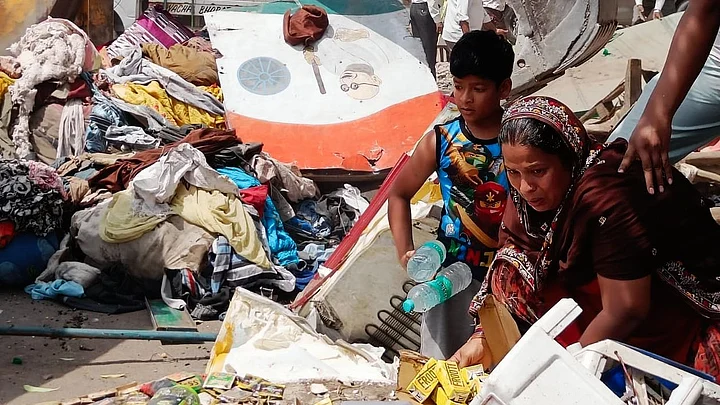One would almost believe that a spectre is haunting India – the spectre of Bangladeshi and Rohingya Muslims – if they listen to the words being uttered by Bharatiya Janata Party (BJP) and Aam Aadmi Party (AAP) leaders. In response to the recent Jahangirpuri violence, Delhi’s Deputy Chief Minister, Manish Sisodia, alleged, “There is hooliganism across the country because of the BJP today … I ask them, in the last eight years, why did the BJP give shelter to Bangladeshis and the Rohingya across the country? They gave shelter to them and then used them to cause communal disharmony across the nation.”
This is twisted logic, but little does the AAP care. In its quest to woo Hindutva voters of the BJP who are disillusioned with them on issues of governance, the AAP has endangered Bengali-speaking Muslims throughout India. Now, there is a concerted attack on them in other states, where anyone who is a Muslim and speaks Bengali is seen as an ‘alien’ citizen.
This misportrayal of Bengali-speaking Muslims as 'illegal Bangladeshi immigrants' (or Rohingya refugees) has caused them enormous suffering. And when such comments come from political leaders, they end up building a narrative wherein not only government officials but the common public, too, starts treating Bengali Muslims as the ‘other’.
'Everyone Here Can Show Documents'
After the demolition drive in Jahangirpuri, which was stayed by a Supreme Court order, Bengali Muslims, who were the key inhabitants of the area, are now relying on documentary citizenship to prove that they are Indian. In a report published in The Hindu, 30-year-old Anwara from the area said, “It hurts us when the government and the media paint us as infiltrators … how can you say this without checking our documents, there has to be a basis for making such comments. Everyone here can show not only their but also documents belonging to their ancestors, if need be.” No report has come from Jahangirpuri so far that has proved that these people are ‘infiltrators’.
However, we know from the discourse around the controversial Citizenship (Amendment) Act (CAA) and the proposed National Register for Citizens (NRC) that even documentary citizenship is not enough for Muslims, especially if they are Bengali-speaking people from West Bengal. They are treated as illegal citizens unless proven Indian as per the narrative fuelled by the likes of Sisodia. The usual charge in such cases is that sympathetic governments in Kolkata over the years have provided these Bengali Muslims, who had ‘illegally’ crossed borders, with identification documents such as Aadhar and Voter IDs.
We know from history how the calls to drive out illegal Bangladeshis have resulted in selective targeting of Bengali-speaking Muslim Indians in cities like Mumbai and Bangalore.
Not only political leaders, but often the common public also participates in such campaigns to ban their employment as guards or maids in posh housing societies.
AAP's Narrative Endangers Muslims Across India
The Jahangirpuri violence has reignited these debates again, causing anxiety to Bengali Muslims living in Indian cities. In Jahangirpuri, most of the victims of the demolition drive claimed that they arrived in New Delhi four decades ago from various districts of West Bengal. They mostly work as waste or scrap collectors or run small shops in the area.
We also must not overlook the caste angle associated with these marginalised Bengali Muslims living in Delhi and contributing to its waste economy. If we look at the histories of migration and the precarious jobs they have been confined to, it becomes clear that their livelihood struggles are directly connected with their position in the caste hierarchy.
Some of these migrant labourers from the Purba and Paschim Medinipur districts of West Bengal, now living in Jahangirpuri, have caste certificates that indicate that they are from the Khotta Muslim community. They were included in the Central list of Other Backward Castes (OBCs) by way of Gazette notification vide no. 12015/05/2011-BC II dt 17/02/2014.
The Waste Collectors of Jahangirpuri
According to a report by the West Bengal Commission of Backward Classes, 70 per cent of these people are landless labourers. Their “dropout rate at every stage of education, namely Primary, Secondary and College level, varies from 60% to 85%”. While submitting evidence of their backwardness to the government commission, they also cited Sharatchandra Chatterjee’s famous novel, Srikanto, to show “how contemptuously the Khotta Muslim class of people are addressed and reprimanded”.
In this context, it is important to highlight how these Bengali Muslim waste collectors of Jahangirpuri have become a target of communal politics in the capital.
Not only are they misrecognised as illegal foreign citizens and their homes demolished, but they are also deprived of constitutional protection as members of other backward castes.
It would not be a stretch to say that such attacks on OBC Muslims should be investigated as caste violence by the National Commission of Backward Castes as per their obligation under the Indian constitution. But with ruling parties whipping up such hysteria against Bengali Muslims, there is little hope for justice.
(Dr Adil Hossain is an Assistant Professor at the School of Development, Azim Premji University. This is an opinion article and the views expressed are the author's own. The Quint neither endorses nor is responsible for them.)
